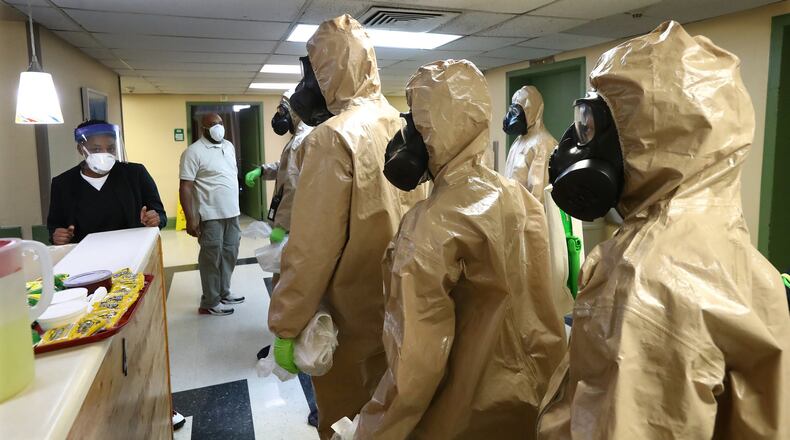Gov. Brian Kemp’s signed an executive order Thursday that lifts a shelter-in-place order for most of Georgia’s 10.6 million residents, though it extends restrictions for the elderly, the medically fragile, nursing homes and businesses.
READ: The full story and Kemp's executive order.
Here are some frequently asked questions about Kemp’s decision:
Q: What does this mean for Georgia residents?
A: The governor is allowing a shelter-in-place order that took effect April 3 to expire. That means, starting Friday, most residents won't have to adhere to guidelines urging them to stay home unless they met one of many exceptions for exercise, work, family matters, medical purposes or other reasons.
Still, Kemp and his top health adviser are encouraging Georgians to stay home if they can and to wear masks if they go to crowded places such as grocery stores.
Q: Kemp didn’t lift the entire order. Who is still covered by the shelter-in-place?
A: The order requires elderly and "medically fragile" residents to shelter in place until June 12, and it also renewed requirements mandating that nursing homes and long-term care facilities take aggressive steps to curb the spread of the virus until the same date.
His office defines the "medically fragile" as people older than 65, residents who live in long-term care facilities, suffer from chronic lung disease, are undergoing cancer treatment, have been diagnosed with COVID-19 or has been exposed to someone with the disease caused by the coronavirus.
But that still doesn't mean people in those categories are forced to stay home. Just as before, there are exceptions for exercise, work, family matters, medical purposes and other reasons spelled out in the order.
Q: Do businesses still have to abide by the state’s guidelines?
A: Yes, at least through May 13. The governor's office has issued a range of requirements for businesses to stay open, such as screening employees for symptoms of the disease, restricting large gatherings, and requiring face masks and other protective gear.
Other businesses have to meet more stringent rules to remain in operation, such as restaurants that want to resume dine-in service, and movie theaters and bowling alleys that want to reopen. Bars and nightclubs also will remain closed through May 13.
Q: What about nursing homes?
A: Kemp extended an executive order through June 12 that bans visitors and nonessential staffers from entering the facilities, requires them to provide in-room dining services if possible, and cancels group meals and outside trips.
Q: How does this fit into Kemp’s overall strategy?
A: The governor has been among the most aggressive in the nation at lifting restrictions. Last week, he ordered that close-contact businesses such as barbershops and nail salons could reopen if they met new standards. And on Monday, restaurants were allowed to resume dine-in services so long as they followed guidelines his office issued.
Q: Can local governments impose more severe restrictions if they want?
A: Like his previous orders, Kemp's statewide mandate restricts Georgia cities and counties from implementing restrictions that are less or more severe than his order. That's infuriated some mayors and county commissioners who have urged residents to disregard his directives.
Q: Georgia is still reporting coronavirus cases and deaths every day. Why is Kemp taking this step now?
A: The governor said he's encouraged by recent state data he said shows the pandemic is starting to subside in Georgia, and that new efforts to ramp-up testing, increase hospital capacity and amass ventilators and other lifesaving equipment have paid off.
Dr. Kathleen Toomey, the state’s public health commissioner, said Georgia has met the federal criteria to begin phasing in sectors of the economy and that residents no longer need a government mandate to abide by social-distancing rules.
“People should want to do this,” she said. “This isn’t saying: Go forth and congregate in large groups. It’s: Go forth and continue to take those precautions.”
Q: What are Kemp’s critics saying?
A: Stacey Abrams, the Republican's opponent in the 2018 governor's race, called it a "callous decision that defies science, facts and logic." State Sen. Nikema Williams, the chairwoman of the Democratic Party of Georgia, accused Kemp of transforming Georgians into "guinea pigs in a public health experiment that will go wrong."
And some public health experts have warned that lifting the restrictions could trigger a new surge in coronavirus cases over the next few weeks.
Q: How does Kemp respond?
A: The governor said the pushback "comes with the territory" of leading the state during an unprecedented crisis. And he invoked the economic fallout from a pandemic that's forced more than one-fifth of Georgians to file for state unemployment benefits over the past five weeks.
“We’re running two races. The first is defeating coronavirus. We’re farther down the road in that race. Now we have the race to start rebuilding our economy,” the governor said in an interview. “It’s going to be a long road, I believe, but we’re taking measured steps to doing that.”
About the Author
Keep Reading
The Latest
Featured





